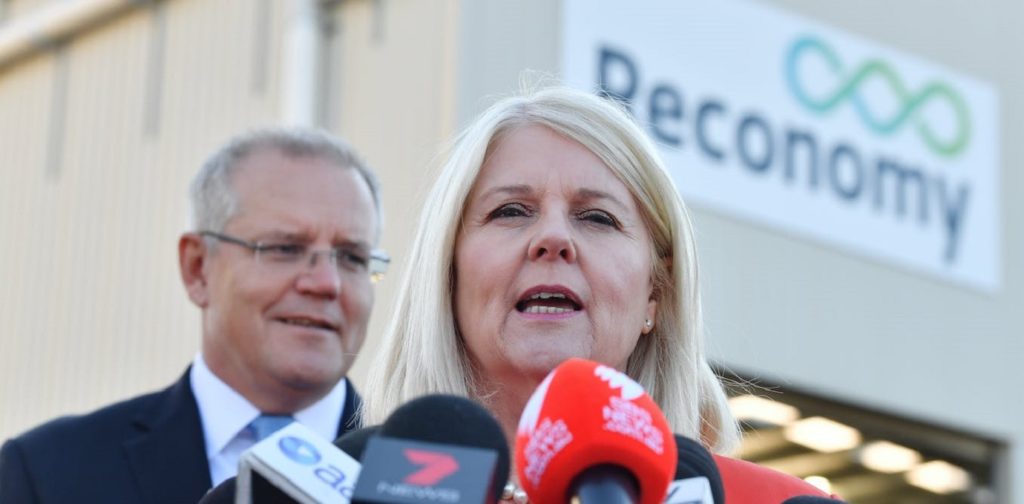Without doubt the parliamentary Liberal Party would be better off if Morrison quit, writes Michelle Grattan, from University of Canberra in this article republished from The Conversation.
Liberal frontbencher Karen Andrews wouldn’t be alone among her colleagues in believing Scott Morrison should quit parliament.
Andrews, home affairs minister in the former government, on Tuesday declared the Australian people were “betrayed” by Morrison’s installing himself in five portfolios, including hers, in secret arrangements.
She was one of the ministers not told he’d moved in. Nor, most remarkably, was treasurer Josh Frydenberg (who a few months later stayed at The Lodge) informed he had a ministerial bedfellow. Likewise finance minister Mathias Cormann.
Andrews has another reason for a heightened sensitivity to Morrison’s willingness to flout conventions and propriety.
When an asylum seeker boat was intercepted on election day, Morrison was determined to try to exploit it politically. The pressure coming from his office onto Andrews’ office to urgently publicise the incident has been documented in a recent inquiry.
While Andrews defended her actions after the report was released, she lost skin.
Without doubt the parliamentary Liberal Party would be better off if Morrison quit.
Even before this week’s revelations, there was nothing he could contribute – he sits as a failure from the past in a party that will have immense trouble adjusting to the future. Now he presents a live target for Labor. Anthony Albanese on Tuesday wouldn’t rule out Labor moving a censure against him.
He enjoys minimal respect among his colleagues. As long as he hangs around, he’ll be a distraction.
Former prime minister John Howard advanced the one pragmatic argument against Morrison quitting – it would create an unwanted and expensive by-election for the Liberals.
“Apart from anything else it is not in the interests of the Liberal Party to have a by-election at the moment in a very safe seat, particularly as in the state of New South Wales we will face a state election in the early part of next year,” Howard said bluntly, interviewed on the ABC on Tuesday night.
Some would add that in these volatile political times no seat is absolutely “safe”.
Morrison hasn’t been expected to see out the parliamentary term. But presumably he needs a job to go to. This week’s stories will have done nothing for his employability.
The disclosure of Morrison’s behaviour has put heat on Governor-General David Hurley.
Hurley was quick to issue a Monday statement setting out how he had acted in accordance with the Constitution. He said it was up to the government whether the arrangements were made public.
To suggest Hurley should not have done what he was asked totally misunderstands his role. He must act according to government advice, assuming what it proposes is legal. (It might be added, however, that a wise governor-general also questions and counsels when circumstances require.)
University of NSW law professor and constitutional specialist George Williams suggests the convention should be put into law that all ministerial appointments be announced to parliament.
On Tuesday Morrison made a belated effort to explain himself. He began on 2GB – his favourite radio roost – but it was a fiasco. He didn’t recall any portfolios other than those initially mentioned (health, finance, resources) into which he’d inserted himself.
It fell to Albanese to add home affairs and treasury. To have apparently forgotten you have made yourself treasurer is really something.
Later Morrison issued a long Facebook post, in which he invoked the “extraordinary times” of COVID that required “extraordinary measures” to justify his actions.
“I took the precaution of being given authority to administer various departments of state should the need arise due to incapacity of a minister or in the national interest.” This was where ministers had specific powers under legislation not subject to cabinet oversight. Health was the major example.
Morrison said treasury and home affairs were added as a “belts and braces” precaution in May 2021.
He explained his lack of memory of key portfolios by saying “there was a lot going on at the time” and the powers hadn’t had to be used.
Why not inform all the relevant ministers, the cabinet, the public? (Health Minister Greg Hunt knew and Morrison did think Cormann had been told, but there was some glitch.) Morrison said he didn’t want ministers “second guessing themselves”, or for their authority to be diminished.
The one area where Morrison used the power he’d acquired was in the resources portfolio, and this had nothing to do with COVID and everything to do with votes. There he became minister so he could overrule the publicly designated minister, Keith Pitt, on the issue of gas exploration off the NSW coast.
“Once having been given the authority to consider this matter I advised the minister of my intention to do so,” Morrison said. “This was the only matter I involved myself directly with in this or any other department”.
Morrison ended his post with an apology “for any offence to my colleagues”. But he showed little sign he comprehended why they would be so deeply offended by his lack of respect, represented by his unwillingness to take them into his confidence.
Michelle Grattan, Professorial Fellow, University of Canberra
This article is republished from The Conversation under a Creative Commons license. Read the original article.


